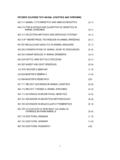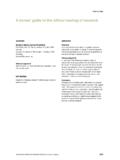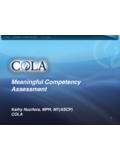Transcription of Crowe Critical Appraisal Tool (CCAT) Form (v1.4) Research ...
1 Crowe Critical Appraisal tool (CCAT) :: Version (19 November 2013) :: Michael Crowe Page 1 of 2 This work is licensed under the Creative Commons Attribution-ShareAlike Unported License. To view a copy of this license, visit Crowe Critical Appraisal tool (CCAT) Form ( ) Reference Reviewer This form must be used in conjunction with the CCAT User Guide ( ); otherwise validity and reliability may be severely compromised. Citation Year Research design (add if not listed) Not Research Article | Editorial | Report | Opinion | Guideline | Pamphlet |.
2 Historical .. Qualitative Narrative | Phenomenology | Ethnography | Grounded theory | Narrative case study | .. Descriptive, Exploratory, Observational A. Cross-sectional | Longitudinal | Retrospective | Prospective | Correlational | Predictive | .. B. Cohort | Case-control | Survey | Developmental | Normative | Case study | .. Experimental True experiment Pre-test/post-test control group | Solomon four-group | Post-test only control group | Randomised two-factor | Placebo controlled trial |.
3 Quasi- experiment Post-test only | Non-equivalent control group | Counter balanced (cross-over) | Multiple time series | Separate sample pre-test post-test [no Control] [Control] | .. Single system One-shot experimental (case study) | Simple time series | One group pre-test/post-test | Interactive | Multiple baseline | Within subjects (Equivalent time, repeated measures, multiple treatment) | .. Mixed Methods Action Research | Sequential | Concurrent | Transformative | .. Synthesis Systematic review | Critical review | Thematic synthesis | Meta-ethnography | Narrative synthesis |.
4 Other .. Variables and analysis Intervention(s), Treatment(s), Exposure(s) Outcome(s), Output(s), Predictor(s), Measure(s) Data analysis method(s) Sampling Total size Group 1 Group 2 Group 3 Group 4 Control Population, sample, setting Data collection (add if not listed) Audit/Review a) Primary | Secondary | .. b) Authoritative | Partisan | Antagonist | .. c) Literature | Systematic | .. Interview a) Formal | Informal | .. b) Structured | Semi-structured | Unstructured | .. c) One-on-one | Group | Multiple | Self-administered |.
5 Observation a) Participant | Non-participant | .. b) Structured | Semi-structured | Unstructured | .. c) Covert | Candid | .. Testing a) Standardised | Norm-ref | Criterion-ref | Ipsative | .. b) Objective | Subjective | .. c) One-on-one | Group | Self-administered | .. Scores Preliminaries Design Data Collection Results Total [/40] Introduction Sampling Ethical Matters Discussion Total [%] General notes Crowe Critical Appraisal tool (CCAT) :: Version (19 November 2013) :: Michael Crowe Page 2 of 2 Appraise Research on the merits of the Research design used, not against other Research designs.
6 Category Item Item descriptors [ Present; Absent; Not applicable] Description [Important information for each item] Score [0 5] 1. Preliminaries Title 1. Includes study aims and design Abstract (assess last) 1. Key information 2. Balanced and informative Text (assess last) 1. Sufficient detail others could reproduce 2. Clear/concise writing , table(s) , diagram(s) , figure(s) Preliminaries [/5] 2. Introduction Background 1. Summary of current knowledge 2. Specific problem(s) addressed and reason(s) for addressing Objective 1.
7 Primary objective(s), hypothesis(es), or aim(s) 2. Secondary question(s) Is it worth continuing? Introduction [/5] 3. Design Research design 1. Research design(s) chosen and why 2. Suitability of Research design(s) Intervention, Treatment, Exposure 1. Intervention(s)/treatment(s)/exposure(s) chosen and why 2. Precise details of the intervention(s)/treatment(s)/exposure(s) for each group 3. Intervention(s)/treatment(s)/exposure(s) valid and reliable Outcome, Output, Predictor, Measure 1. Outcome(s)/output(s)/predictor(s)/measur e(s) chosen and why 2.
8 Clearly define outcome(s)/output(s)/predictor(s)/measur e(s) 3. Outcome(s)/output(s)/predictor(s)/measur e(s) valid and reliable Bias, etc 1. Potential bias , confounding variables , effect modifiers , interactions 2. Sequence generation , group allocation , group balance , and by whom 3. Equivalent treatment of participants/cases/groups Is it worth continuing? Design [/5] 4. Sampling Sampling method 1. Sampling method(s) chosen and why 2. Suitability of sampling method Sample size 1. Sample size , how chosen , and why 2.
9 Suitability of sample size Sampling protocol 1. Target/actual/sample population(s): description and suitability 2. Participants/cases/groups: inclusion and exclusion criteria 3. Recruitment of participants/cases/groups Is it worth continuing? Sampling [/5] 5. Data collection Collection method 1. Collection method(s) chosen and why 2. Suitability of collection method(s) Collection protocol 1. Include date(s) , location(s) , setting(s) , personnel , materials , processes 2. Method(s) to ensure/enhance quality of measurement/instrumentation 3.
10 Manage non-participation , withdrawal , incomplete/lost data Is it worth continuing? Data collection [/5] 6. Ethical matters Participant ethics 1. Informed consent , equity 2. Privacy , confidentiality/anonymity Researcher ethics 1. Ethical approval , funding , conflict(s) of interest 2. Subjectivities , relationship(s) with participants/cases Is it worth continuing? Ethical matters [/5] 7. Results Analysis, Integration, Interpretation method 1. method(s) for primary outcome(s)/output(s)/predictor(s) chosen and why 2.






